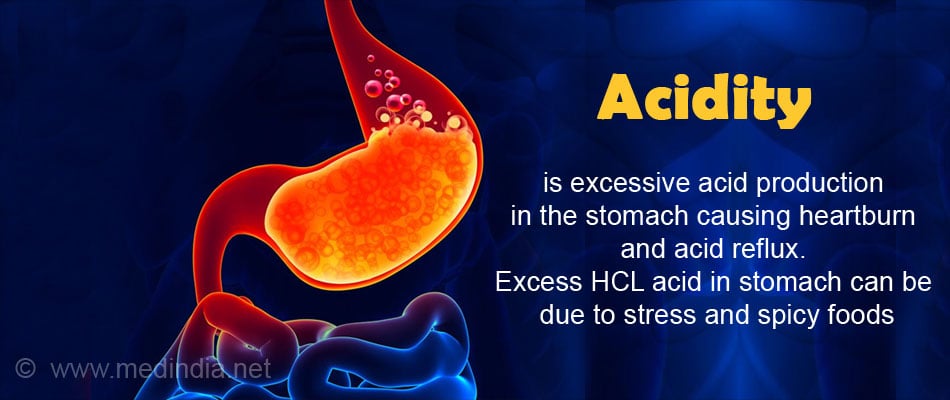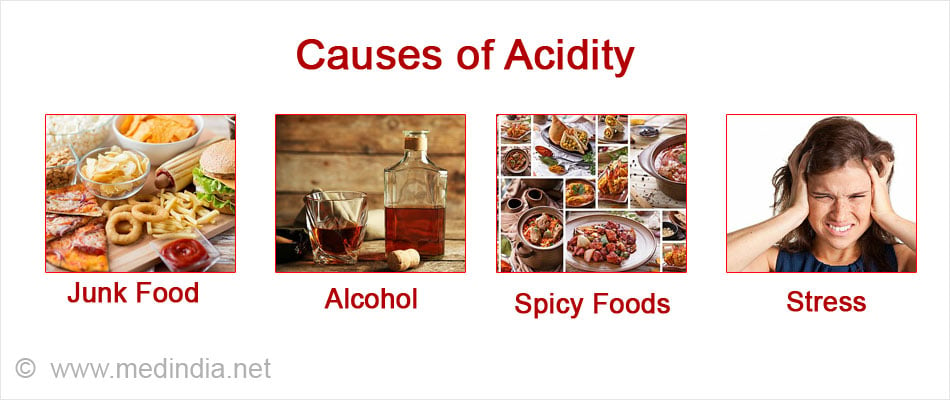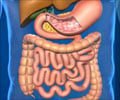- Gastric acid - (https://en.wikipedia.org/wiki/Gastric_acid)
- The Evolution of Stomach Acidity and Its Relevance to the Human Microbiome - (http://journals.plos.org/plosone/article?id=10.1371/journal.pone.0134116)
- Acid Content of Fruits and Vegetables for Home Canning and Preserving - (http://www.pickyourown.org/food_acidity.htm)
- Long-term Antacid Use Linked to B12 Deficiency - (http://www.healthguidance.org/entry/12512/1/What-Causes-Too-Much-Stomach-Acid.html)
- Gastric Balance: Heartburn Not Always Caused by Excess Acid - (http://wonderopolis.org/wonder/how-powerful-is-stomach-acid)
- How Powerful Is Stomach Acid? - (https://nutritionreview.org/2013/04/gastric-balance-heartburn-caused-excess-acid/)
- What Causes Too Much Stomach Acid? - (https://health.clevelandclinic.org/2014/01/long-term-antacid-use-linked-to-b12-deficiency/)
What is Acidity?
Acidity is described in terms of the pH value of a substance. The pH value ranges from 0 to 14 and is an indication of the acidity or basicity of an aqueous solution. A value of zero indicates highly acidic, a value of 7 indicates neutrality and a pH of 14 signifies highly basic or alkaline. Water has a pH value of 7.
Acidity in the stomach is the result of excess gastric acid production that may cause heartburn and other problems. The purpose of the acid secreted in moderate quantities in the stomach is to aid in the digestion of proteins that are consumed. The pH of the stomach acid ranges between 1.5 to 3.5.

Food consumed via the mouth passes through the pharynx (back of the throat), esophagus or the food pipe and reaches the stomach. Food is mixed with saliva in the mouth and reaches the stomach in about seven seconds. At the end of the esophagus is the flap called lower esophageal sphincter (LES) that opens to let the food into the stomach.
The sphincter is a one-way flap that allows the food to go from esophagus to stomach and not backwards. Occasionally, the acid or the food contents are pushed back into the esophagus from the stomach, and the esophagus lining gets disturbed. The lining of the esophagus is not as well protected as that of the stomach. This acidity of the esophagus causes heartburn. The condition is experienced as a painful burning sensation in the middle of the chest.
What is Gastric Acid and it’s Role in the Stomach?
Gastric acid or the stomach acid is mainly composed of hydrochloric acid, chemically called HCl. The gastric acid also contains potassium chloride and sodium chloride. The acid is produced by the cells that form the lining of the stomach. Some cells in the stomach produce a base called bicarbonate to buffer the acid medium of the stomach. Mucus is also produced by the cells to cover the inner lining of the stomach and prevent the acid damaging the stomach.
When the food in the stomach goes to the next level, which is the small intestine, it gets neutralized. This is because the duodenum, the first part of the small intestine produces large amounts of bicarbonate.
Gastric Acid and Protein Breakdown:
- Gastrin is the enzyme that triggers the production of gastric acid in the stomach. It is produced by the inner linings of the stomach.
- Meanwhile, pepsinogen, an enzyme, is secreted by the gastric chief cells to breakdown the proteins.
- Hydrochloric acid activates pepsinogen into the enzyme pepsin.
- Pepsin breaks the bonds that link amino acids in proteins, unfolding the protein structure and revealing the peptide bonds. This process is called proteolysis.
- Many harmful microbes are killed in this acidic medium.
Why are the Causes of Excess Acid Secretion?
The lining of the stomach secretes hydrochloric acid at regular intervals to be ready with the acidic environment to breakdown food proteins. But when a person does not eat at regular intervals the acid gets accumulated. The increased quantity of acid can cause discomfort to the individual.
Helicobacter pylori and non-steroidal anti-inflammatory drugs are the two most commonly known triggers of acid in the stomach. Stomach cancer and ulcers can trigger gastrin that stimulates the production of hydrochloric acid.

Excess production of acid in the stomach can result in heartburn.
What are the Causes of Acidity?
Various factors can cause acidity of the stomach. These include food items, lifestyle, eating habits, exercise and body type.
Various Food Types that Cause Acidity
| Food type | Example | How acidity is triggered? |
| Junk food | Deep fried foods | Foods rich in oil and butter remain in the stomach for a long time and trigger more acid production. This is because fat slows down the rate of food passing into the intestine. |
| Eating issues | Overeating and eating just before bedtime | Overeating produces more acid in the stomach. Eating within 1 hour of bedtime can cause the contents of the stomach to stay for a longer time and trigger acid production. |
| Caffeine | Chocolate, tea, coffee, soft drinks | Caffeine containing foods are highly acidic in nature and stimulate further production of gastric acid. |
| Citrus fruits | Lemon, orange, sweet lime, grapefruit | Citric acid in citrus fruits can increase the already acidic medium of the stomach. |
| Alcohol | Wine, beer | By nature, alcohol tends to relax all the muscles including the lower esophageal sphincter. Large amounts of alcohol can irritate the lining of the stomach and intestine or even bring the digestive process to a halt. |
| Soda | Carbonated drinks | The bubbles of carbonation tend to expand once they reach the stomach and create pressure on the esophageal sphincter, causing it to open the wrong way and result in heartburn. |
| Spicy foods | Paprika, vinegar, pepper, chilies, cinnamon | Though moderate amounts of spices are good for the digestive tract, high quantities can stimulate gastrin, resulting in excess hydrochloric acid in the stomach. |
| Medications | Pain killers, NSAIDs, antibiotics, chemotherapy medicines, bisphosphonates | Some medicines can cause the LES to relax and cause the acid in the stomach to regurgitate. Some of them can injure the esophageal lining and cause heartburn. |
| Stress | Worry, fear or depression | Our body responds to stress with a “fight or flight” reaction |

Other foods and triggers that can cause acidity include:
- Nuts like peanuts, walnuts
- Sweeteners – sugar, processed honey, artificial sweeteners like aspartame
- Condiments like vinegar, mayonnaise, salad dressing
- Processed foods and processed cheese
- Grains and whole pulses
- Obesity
- Eating just before a vigorous physical activity
- Pregnancy, especially during the first trimester
Hiatal Hernia and Acid Reflux:
The diaphragm is a thick membrane that separates the chest cavity from the abdominal cavity. Hiatus is an opening in the diaphragm to allow the esophagus to get connected with the stomach. Hernia is a term used for a condition when an internal body part pushes itself to another area.
When the stomach pushes upwards through the hiatus and bulges into the chest, it causes the esophageal sphincter to malfunction and allow the contents of the stomach to move back to the esophagus.
What are the Symptoms and Signs of Acidity?
Symptoms of gastric acidity include:
- Burning sensation in the stomach
- Pain in the upper abdominal area
- Burning sensation in the chest and throat (commonly known as heartburn)
- Excessive belching and sometimes sour sensation during belching
- Sour taste in mouth
- Nausea or vomiting
- Bloating of stomach

Certain signs of acidity can help in identifying and diagnosis of acidity:
- Narrowing of the esophagus
- Blood in stools or vomit
- Unexplained weight loss
How do you Diagnose Acidity?
Diagnostic tests can help in understanding the extent of acidity and help in deciding the course of the treatment.
Some diagnostic tests for acidity include:
- Barium: A solution containing barium is swallowed and the movement is tracked using an X-ray.
- pH Monitoring: A device is inserted into the patient’s esophagus and left there for 1 or 2 days. The device measures the amount of acid in the esophagus.
- Esophageal Manometry: A device to check the function of the esophagus and the lower esophageal sphincter.
- Endoscopy: A long flexible tube that has a light and a camera is inserted down the throat. The camera shows the esophagus and the stomach, their contents and the mucus lining.
- Biopsy: A small sample of the stomach tissue may be taken for analysis and biopsy. The sample is usually taken during endoscopy.
How do you Treat Acidity?
Acidity and acid reflux can be treated with changes in diet, lifestyle and medications. Diet changes include eating smaller, more frequent but regular meals, choosing the right food and avoiding foods that can trigger acidity.
Lifestyle changes include quitting smoking and drinking, increasing physical activity and weight management.
Medications for acidity may be prescribed or bought over the counter.
Foaming agents help reduce acidity by coating the lining of the stomach or forming a foamy layer on the top of the contents of the stomach.
Proton pump inhibitors help prevent the acid production.

Prokinetics work by emptying the stomach faster and also strengthen the esophageal sphincter.
Antacids neutralize the acid in the stomach; overuse may cause diarrhea or constipation. They are usually taken after meals.
H2 blockers decrease the acid production in the stomach. They are usually taken before meals.
What Happens When You take Antacids?
Antacids are chemicals that neutralize acids of the stomach. Both acids and alkalis corrode the esophageal and stomach lining. But when they combine in equal strength and quantities, salt and water are formed and the stomach lining is saved from corrosion. The burning pain and heartburn are immediately relieved.
Some antacids include alginates that form a gel on the top of the contents of the stomach, preventing the acidic fumes to go up to the esophagus.
Antacids are composed of different types of chemicals like aluminium hydroxide, magnesium hydroxide, sodium bicarbonate and calcium bicarbonate. Each of these antacids can buffer or neutralize the acidic stomach. However, some may cause constipation while others may cause diarrhea when consumed in excess.
What are the Complications of Acidity?
When acidity is not treated properly or at the right time, the excessive acid in the stomach can weaken the defense mechanism of the stomach lining. Ulcers can be formed in the esophagus, stomach and duodenum. GERD is another complication of chronic acidity.
Stomach Ulcers:
Stomach ulcers are formed when the highly acidic medium of the stomach disturbs its protective mucus lining and exposes the lining tissues to the acid. When the acid is not neutralized by the bicarbonates of the duodenum, ulcers are formed in the duodenal lining also.

Gastro-Esophageal Reflux Disease (GERD):
Also known as acid reflux, it is a chronic condition in which the contents of the stomach regurgitate into the esophagus. This happens when the esophageal sphincter fails to block the contents of the stomach from going back to the esophagus.
GERD can be caused by various other factors, but can also be one of the complications of poorly treated prolonged gastric acidity.
The taste of acid is felt in the mouth along with bad breath. Other symptoms include chest pain, breathing problems, wearing away of the teeth and vomiting.
How do you Prevent Acidity?
Acidity can be prevented by changing certain food items, patterns and eating habits. Some of the ways to prevent acidity are as follows:
- Eating more fruits and vegetables that are not very acidic.
- Eating small-sized meals at regular intervals.
- Eating dinner at least 1 – 2 hours before going to sleep.
- Maintaining a healthy weight.
- Exercising.
- Drinking at least 3 liters of water a day.
- Not drinking water for up to 30 minutes before a meal and one hour after a meal.
- Not wearing tight belts or clothes that compress the abdomen area.
Health Tips
The following points are to be considered if the person is already prone to acidity,
- Coffee, tea, chocolate and alcoholic beverages are to be avoided.
- Smoking is to be avoided.
- Antacids should be taken sparingly; alkaline foods would be a better alternative.
- Smaller-sized, regular meals are a good way to keep acidity at bay.
- Prescribed medicines would need to be taken with antacids (on consulting with the doctor) so as to not further corrode the stomach.










